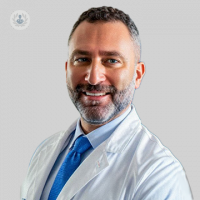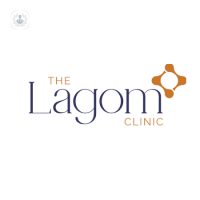What is a men’s health check?
A men’s health check is a screening service that can detect the early warning signs of a range of health conditions affecting men, such as diabetes and prostate cancer.
Using the results of a men's health check, specialists can build a clear picture of what your current health is like and identify any future risks. After you have taken the tests and received the results, you will be provided with support and guidance to help you to stay healthy.

What health checks does this service offer?
The full range of men's health tests and checks vary between clinics, but it usually involves the following:
- Measuring your height and weighing you.
- Checking your risk of having a heart attack or stroke.
- Lifestyle assessment including diet, exercise, alcohol intake and smoking.
- Full medical history.
- Prostate and testicular cancer screening.
- Chest X-ray.
- Blood and urine tests.
- Checking your lung function.
- Cardiac tests such as an electrocardiogram (ECG).
- Blood pressure test.
- Cholesterol tests.
Why are men's health tests done?
Early detection of certain health conditions allows for rapid treatment and regular monitoring which offers you the best chance of recovery.
Some men are more at risk of developing certain diseases. For example, if you have a family history of a particular disease then you might be at a higher risk of developing it too at some point. Similarly, certain symptoms that men often ignore, such as recurrent urinary tract infections, can indicate underlying health problems such as benign prostate enlargement or prostate cancer. Your health check will be able to identify these health risks.
What health conditions can a men's health check detect?
Men’s health checks screen thoroughly for a range of conditions from heart disease to prostate cancer. Early detection of serious health conditions is central to this service. Below is a list of conditions that a men's health check look for:
- Hypertension (high blood pressure)
- Diabetes
- High cholesterol
- Thyroid and liver disease
- Heart disease
- Prostate cancer
- Testicular cancer
- Erectile dysfunction
- Bladder cancer
What happens before and after a men's health check?
Usually, you will be asked to fill out some kind of pre-screen questionnaire to help the doctor decide which screens are recommendable to you. You will then be offered a series of tests tailored specifically to your age, lifestyle and family history.
It can take between 24 to 48 hours to receive the results of a men's health check. You will have to go back and see the doctor who will talk you through them. The steps that follow depend on your results, but may include recommended treatment and a referral to a specialist doctor. They will also give you advice on what lifestyle changes are needed to improve your health.
How much does a men's health check cost?
The price of a full men’s health check can vary depending on the clinic but typically lies somewhere between £500 and £900.
05-04-2020 01-12-2024Men's health check
Mr Giangiacomo Ollandini - Urology
Created on: 05-04-2020
Updated on: 01-12-2024
Edited by: Karolyn Judge
What is a men’s health check?
A men’s health check is a screening service that can detect the early warning signs of a range of health conditions affecting men, such as diabetes and prostate cancer.
Using the results of a men's health check, specialists can build a clear picture of what your current health is like and identify any future risks. After you have taken the tests and received the results, you will be provided with support and guidance to help you to stay healthy.

What health checks does this service offer?
The full range of men's health tests and checks vary between clinics, but it usually involves the following:
- Measuring your height and weighing you.
- Checking your risk of having a heart attack or stroke.
- Lifestyle assessment including diet, exercise, alcohol intake and smoking.
- Full medical history.
- Prostate and testicular cancer screening.
- Chest X-ray.
- Blood and urine tests.
- Checking your lung function.
- Cardiac tests such as an electrocardiogram (ECG).
- Blood pressure test.
- Cholesterol tests.
Why are men's health tests done?
Early detection of certain health conditions allows for rapid treatment and regular monitoring which offers you the best chance of recovery.
Some men are more at risk of developing certain diseases. For example, if you have a family history of a particular disease then you might be at a higher risk of developing it too at some point. Similarly, certain symptoms that men often ignore, such as recurrent urinary tract infections, can indicate underlying health problems such as benign prostate enlargement or prostate cancer. Your health check will be able to identify these health risks.
What health conditions can a men's health check detect?
Men’s health checks screen thoroughly for a range of conditions from heart disease to prostate cancer. Early detection of serious health conditions is central to this service. Below is a list of conditions that a men's health check look for:
- Hypertension (high blood pressure)
- Diabetes
- High cholesterol
- Thyroid and liver disease
- Heart disease
- Prostate cancer
- Testicular cancer
- Erectile dysfunction
- Bladder cancer
What happens before and after a men's health check?
Usually, you will be asked to fill out some kind of pre-screen questionnaire to help the doctor decide which screens are recommendable to you. You will then be offered a series of tests tailored specifically to your age, lifestyle and family history.
It can take between 24 to 48 hours to receive the results of a men's health check. You will have to go back and see the doctor who will talk you through them. The steps that follow depend on your results, but may include recommended treatment and a referral to a specialist doctor. They will also give you advice on what lifestyle changes are needed to improve your health.
How much does a men's health check cost?
The price of a full men’s health check can vary depending on the clinic but typically lies somewhere between £500 and £900.


Testicular pain: when to see a specialist
By Mr Andrew Ballaro
2025-02-05
When testicle pain becomes serious, it's important to seek medical advice. Senior urology consultant Mr Andrew Ballaro considers chronic testicular pain and what you should do if you have it. See more


Gynaecomastia: why you have ‘man boobs’ and what you can do about them
By Professor Kefah Mokbel
2025-02-04
While there are many causes, enlarged breasts in men are simply a result of having excess fat tissue around the chest area, but the condition can cause feelings of shame, self-hate, inadequacy and embarrassment. The treatment for gynaecomastia will depend on what is causing it and it's severity. Professor Kefah Mokbel, a renowned oncoplastic surgeon explains more. See more


Shining a light on male menopause
By Dr Daniel Wright
2025-02-04
Menopause symptoms in men can be just as debilitating as those in women. London-based general practitioner Dr Daniel Wright is here to highlight exactly how it manifests and ways to go about relieving male menopause in this informative and reassuring article. See more


UTIs in men and women: what’s normal and what’s not
By Mr Sam Datta
2025-02-04
UTIs are common in women and aren't usually anything to worry about; but for men, they are not normal - particularly if they are happening frequently. Mr Sam Datta, a top consultant urologist explains the differences in UTIs between men and women. See more
Experts in Men's health check
-
Dr Amandeep Singh Grewal
GP (general practitioner)Expert in:
- Allergy
- Men's health check
- Acne
- Health check up (health screening)
- Cosmetic dermatology
- Hair loss
-
Dr Wayne Cottrell
GP (general practitioner)Expert in:
- Sexually transmitted infections (STIs)
- Men's health check
- Sexual health
- Vaccinations
- Paediatrics
- Genital warts
-
Dr Mohamed Khan
GP (general practitioner)Expert in:
- Preventive medicine
- Chronic diseases
- Health check up (health screening)
- Men's health check
- Well-woman screening
- Headache
-
Dr Amar Lally
GP (general practitioner)Expert in:
- Cosmetic dermatology
- Men's health check
- Sexual health
- Women's health
- Weight loss
- Sexually transmitted infections (STIs)
-
Dr Lawen Muheden
GP (general practitioner)Expert in:
- Men's health check
- Sports medicine
- Health check up (health screening)
- Sexual health
- Nutrition
- See all

LSDC Healthcare
LSDC Healthcare
23 Widegate St, London E1 7HP, United Kingdom
No existe teléfono en el centro.
By using the telephone number provided by TOP DOCTORS, you automatically agree to let us use your phone number for statistical and commercial purposes. For further information, read our Privacy Policy
Top Doctors

Platinum Medical Centre (HCA)
Platinum Medical Centre (HCA)
15-17 Lodge Road, NW8 7JA
No existe teléfono en el centro.
By using the telephone number provided by TOP DOCTORS, you automatically agree to let us use your phone number for statistical and commercial purposes. For further information, read our Privacy Policy
Top Doctors

The Lagom Clinic
The Lagom Clinic
4 Redland Court Road
No existe teléfono en el centro.
By using the telephone number provided by TOP DOCTORS, you automatically agree to let us use your phone number for statistical and commercial purposes. For further information, read our Privacy Policy
Top Doctors
-
LSDC Healthcare
23 Widegate St, London E1 7HP, United Kingdom, Central LondonExpert in:
- Abdominal ultrasound
- Achalasia
- Digestive
- Inflammatory bowel disease
- Gastroenterology
- Acid reflux
-
Platinum Medical Centre (HCA)
15-17 Lodge Road, NW8 7JA, Central LondonExpert in:
- Digestive
- Cancer
- Orthopaedic surgery
- Diagnostic Imaging
- Spine
- Physiotherapy
-
The Lagom Clinic
4 Redland Court Road, BristolExpert in:
- Blood test
- Men's health check
- Cancer screening clinic
- Musculoskeletal pain
- Women’s health
- Health check up
- See all
- Most viewed diseases, medical tests, and treatments
- Cardiovascular disease
- Polycystic ovary syndrome (PCOS)
- Cardiac screening
- Respiratory infection
- Menopause support
- Alzheimer's disease
- Cluster headaches
- Tension headache
- Chronic headache
- Electrophysiology study








